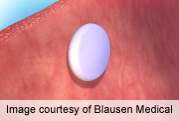For patients with cancer, statin use prior to diagnosis correlates with reduced all-cause and cancer-related mortality, according to a study published in the Nov. 8 issue of the New England Journal of Medicine.
(HealthDay)—For patients with cancer, statin use prior to diagnosis correlates with reduced all-cause and cancer-related mortality, according to a study published in the Nov. 8 issue of the New England Journal of Medicine.
In an effort to examine whether statin use initiated before cancer diagnosis reduced cancer-related mortality, Sune F. Nielsen, Ph.D., from Copenhagen University Hospital in Denmark, and colleagues evaluated mortality among patients from the Danish population who had received a diagnosis of cancer between 1995 and 2007 and were followed up through December 2009. The cohort included 18,271 patients aged 40 or older who had used statins regularly before diagnosis, and 277,204 patients who had never used statins.
The researchers found that, compared with non-users, for statin users the multivariable-adjusted hazard ratios were significantly lower and were 0.85 each for death from any cause and death from cancer. The adjusted hazard ratios for all-cause mortality varied according to the defined daily dose of statin per day and were 0.82 for a dose of 0.01 to 0.75; 0.87 for a dose of 0.76 to 1.50; and 0.87 for a dose higher than 1.50. The corresponding hazard ratios for cancer-related mortality were 0.83, 0.87, and 0.87, respectively. For each of 13 cancer types there was reduced cancer-related mortality for statin users versus non-users.
"In conclusion, among patients with cancer, we observed an association between statin use at the time of diagnosis and a reduced risk of cancer-related mortality, with a reduction of up to 15 percent," the authors write. "Prospective evaluation of the hypothesis that statin use prolongs the survival of patients with cancer is needed."
One author disclosed financial ties to the pharmaceutical industry.
More information:
Full Text (subscription or payment may be required)
Editorial (subscription or payment may be required)
Journal information: New England Journal of Medicine
Copyright © 2012 HealthDay. All rights reserved.



















